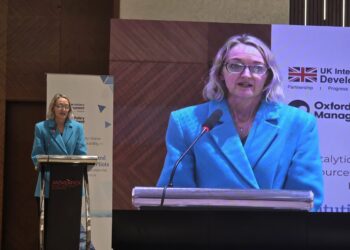ISLAMABAD; The Pakistan Institute of Development Economics (PIDE), in collaboration with the Planning Commission’s RASTA initiative, organized a seminar titled “Pakistan’s Groundwater Crisis: Policy Lessons and a Framework for Sustainable Resource Use” at its Islamabad campus.
The session, moderated by PIDE Research Fellow Dr. Muhammad Faisal Ali, featured Mr. Nazam Maqbool, Social Scientist and Project Manager at RASTA, as the keynote speaker.
Dr. Faisal opened the discussion by highlighting Pakistan’s alarming shift from a water-stressed to a water-scarce country, noting that per capita water availability has fallen from over 5,000 cubic meters in 1947 to less than 1,000 today. He stressed that while surface water shortages and climate change receive policy attention, groundwater depletion—the nation’s “silent lifeline”—is being dangerously ignored.
In his presentation, Mr. Maqbool explained that Pakistan is one of the most arid countries globally, receiving only 494 millimeters of rainfall annually. The Indus River system provides around 96 percent of the total water supply, with nearly 78 percent of this water originating beyond Pakistan’s borders.
Despite being home to the world’s fourth-largest aquifer, Pakistan now extracts 10 cubic kilometers more groundwater annually than is naturally replenished, creating a growing water deficit.
He traced this crisis to historical canal systems and state-driven tubewell expansion, which has led to more than 1.5 million unregulated wells across the country. Excessive pumping, supported by electricity subsidies, has accelerated depletion and contamination—exposing 60 million people to arsenic and leaving the majority of urban and rural populations dependent on unsafe water sources.
Identifying weak governance as the root of the problem, Mr. Maqbool pointed to the lack of a national groundwater law, overlapping institutional mandates, poor provincial coordination after the 18th Amendment, and underfunded utilities. He noted that water tariffs in Punjab average just $0.12 per cubic meter, far below the global average of $2.36, promoting overuse.
To address the crisis, Mr. Maqbool proposed a seven-pillar framework focusing on:
- Establishing a National Groundwater Council for coordination and policy alignment;
- Implementing provincial-level licensing, metering, and pricing reforms;
- Developing real-time aquifer monitoring systems;
- Investing in recharge and drainage infrastructure;
- Promoting crop diversification toward low-water-demand crops;
- Introducing irrigation efficiency incentives; and
- Expanding public awareness and institutional capacity-building.
Citing international best practices, he referenced Israel’s reuse of 90 percent of treated wastewater and U.S. cities like St. Paul and Duluth, which halved their water consumption through reforms.
Mr. Maqbool emphasized that Pakistan must adopt modern water pricing, strengthen regional cooperation within the Indus Basin, and move toward evidence-based groundwater governance.
Concluding the session, Dr. Faisal Ali underscored that groundwater management is not merely a sustainability concern but a national security imperative, urging coordinated and science-driven policy action.





































































